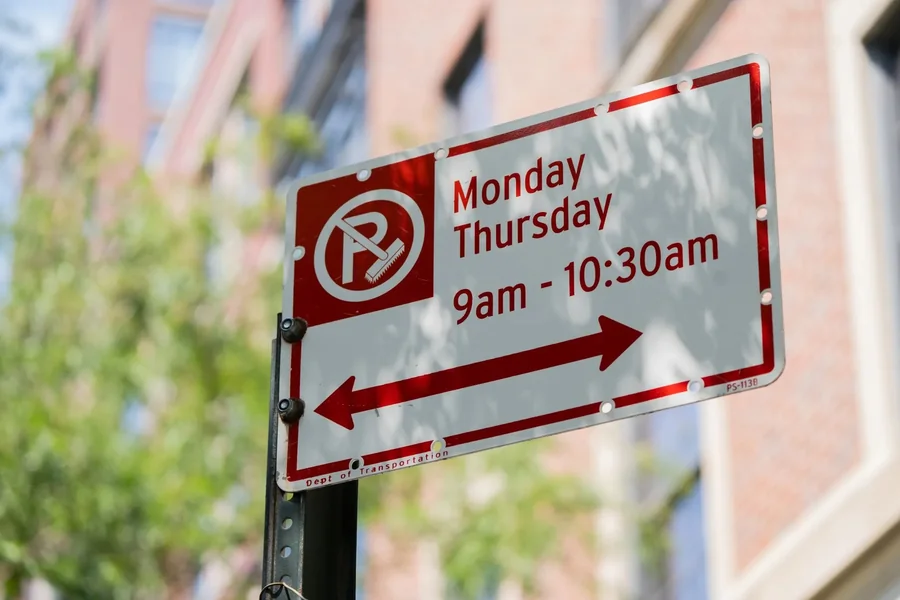You’ve scheduled a cleaning service. The team is supposed to arrive at 9 AM sharp. But it’s 9:30, then 10:00, and you’re still waiting. Sound familiar?
Here’s the thing: in New York City, getting to your door isn’t as simple as just driving up and parking. Between alternate side parking rules, no-standing zones, expensive meters, and aggressive traffic agents, professional cleaning teams face a daily logistical puzzle that directly impacts your service.
This isn’t just about inconvenience. It’s about understanding why that perfectly scheduled cleaning sometimes starts late, costs what it does, and requires the coordination skills of a NASA mission controller. Let’s pull back the curtain on what really happens when a cleaning crew tries to navigate the concrete jungle.
The Real Cost of Parking in NYC
Most people don’t think about where their cleaning team parks. Why would you? But here’s what matters: parking challenges directly affect your cleaning service quality and timing.
Professional cleaning teams haul serious equipment. We’re talking vacuum cleaners, mops, buckets, specialty cleaning solutions, and various tools. They can’t just hop on the subway with all that gear. They need vehicles. And those vehicles need to go somewhere.
The numbers tell a brutal story. Parking violations in NYC can range from $45 for expired meters to $115 for blocking a hydrant. Many cleaning companies factor these costs into their pricing because they’re unavoidable. It’s not uncommon for a team to receive two or three tickets per week, adding hundreds of dollars to monthly operating costs.
But the financial hit isn’t the worst part. The time drain is what really hurts. Circling blocks for 20 minutes searching for legal parking means your cleaning starts late. The cleaner’s stress level goes up. Their efficiency drops. You get less value for your money.
Understanding NYC’s Parking Labyrinth
Want to know the secret? The best Cleaning Service in NYC operations don’t just hire good cleaners. They hire logistics experts who understand the city’s parking ecosystem.
Let’s break down what cleaning teams face:
Alternate Side Parking Rules: These street cleaning regulations vary by neighborhood, day, and time. A spot that’s legal at 10 AM becomes a $45 ticket waiting to happen at 10:30 AM. Professional teams need intimate knowledge of dozens of different neighborhood schedules.
Commercial Loading Zones: These seem perfect for cleaning vehicles, right? Wrong. Most are restricted to specific hours and require commercial plates. Even then, enforcement varies wildly between Manhattan, Brooklyn, and Queens.
Metered Parking: Sure, you can feed the meter. But many cleaning jobs take 2-4 hours. Most meters max out at two hours. Do the math on the time waste alone, not even counting the cost.
Residential Permit Zones: Common in neighborhoods like Park Slope or the Upper West Side, these areas require special permits that cleaning companies often can’t obtain.
The exception is buildings with dedicated service entrances or parking areas. Those gold-star locations make everyone’s life easier. But they’re rare outside luxury high-rises.
How Top Services Solve the Parking Problem
This doesn’t work if you just throw cleaners into vans and hope for the best. Professional operations like Maid Sailors have developed sophisticated systems to handle NYC’s parking chaos.
Here’s what separates the pros from the amateurs:
Advanced Route Planning: The best teams don’t just schedule back-to-back appointments. They map routes considering parking availability, alternate side rules, and neighborhood characteristics. A cleaning in Midtown Manhattan at 2 PM requires completely different logistics than one in Astoria at the same time.
Real-Time Communication Systems: When a cleaner finds themselves in parking purgatory, immediate communication becomes critical. Top services maintain open text, email, and phone channels so clients get instant updates. You’re not left wondering where your team is. You know exactly what’s happening.
Strategic Timing Windows: Professional services often suggest appointment times based on parking availability, not just your preference. A 10 AM start in a residential neighborhood might be impossible on Tuesday due to alternate side rules, but perfectly feasible on Wednesday.
Backup Transportation Plans: Some situations call for public transit plus equipment delivery services. Others require splitting teams between parking locations. The ability to pivot quickly separates exceptional services from mediocre ones.
The Building Type Factor
Your building type dramatically changes the parking equation. Let’s look at how different structures create different challenges:
| Building Type | Parking Challenge Level | Common Solutions | Average Time Impact |
| Doorman High-Rise | Low | Service entrance access, temporary loading zone use | Minimal (0-5 min) |
| Walk-up Apartment | High | Street parking hunt, possible tickets | Significant (15-30 min) |
| Townhouse | Medium | Residential permit zones, neighbor conflicts | Moderate (10-20 min) |
| Commercial Building | Medium | Loading dock access, specific time windows | Moderate (10-15 min) |
| Outer Borough Home | Low-Medium | More available street parking | Low (5-10 min) |
Doorman buildings often have loading docks or service areas. But even these come with rules. Many restrict service elevator access to specific hours. Your cleaner might find perfect parking but still can’t access your unit until the freight elevator becomes available.
Walk-ups present the worst scenario. No service entrance, no loading zone, no special accommodation. Just the wild west of NYC street parking. This is where experience really matters.
What This Means for Your Cleaning Appointment
You might feel overwhelmed by all these logistics. That’s exactly why choosing a service with proven NYC experience matters so much.
Look, a company that doesn’t understand parking logistics will pass frustrations directly to you. Late arrivals become routine. Rushed cleanings sacrifice quality. Hidden parking costs appear in inflated pricing.
But here’s what a professional operation brings:
Accurate Time Estimates: When Maid Sailors says they’ll arrive at 10 AM, they’ve already factored in the parking situation for your specific building and neighborhood. Their estimate accounts for real-world NYC conditions.
Transparent Communication: You get updates if parking problems arise. No mysterious delays. No excuses. Just honest communication about what’s happening.
Trained Problem Solvers: Their teams don’t panic when the perfect parking spot disappears. They have backup plans, knowledge of nearby alternatives, and the experience to adapt quickly.
Included Supplies: Since professional services bring all their own cleaning products, they’re not making multiple trips to their vehicle during the job. One parking solution handles the entire appointment.
The Insurance and Liability Angle
Here’s something most people never consider: what happens when your cleaning team gets a parking ticket?
Some companies expect cleaners to pay their own tickets. This creates perverse incentives. Cleaners might block hydrants, double-park dangerously, or take other risks to avoid tickets they’d personally pay. That’s not just unprofessional. It’s potentially dangerous.
Professional services that employ cleaners directly (rather than using contractors) typically cover parking costs as a business expense. This keeps cleaners focused on your cleaning quality rather than watching the clock for parking enforcement officers.
The bonded and insured aspect becomes critical here too. If a cleaning vehicle causes an accident while hunting for parking, proper insurance protects you, your building, and other residents.
Special Considerations for Different Services
The parking challenge shifts based on what kind of cleaning you need.
Regular Maintenance Cleaning: These appointments benefit from consistency. The same team visits regularly and learns your building’s parking patterns. They know the building superintendent, understand the optimal arrival windows, and have tested backup options.
Deep Cleaning Services: These jobs require more equipment and longer time commitments. A standard maintenance clean might need a vacuum and some spray bottles. A deep clean requires carpet cleaners, specialized scrubbers, and more supplies. More equipment means parking becomes even more critical.
Condo cleaning NYC situations often provides better parking access than rental apartments. Condo buildings frequently have dedicated service areas and more flexible policies. Still, cleaners need to understand the building’s specific rules.
Move-Out Cleanings: Time pressure intensifies here. You’re coordinating movers, final walkthroughs, and key returns. The last thing you need is a cleaning team delayed by parking problems. Professional services prioritize these appointments with extra time buffers.
Technology’s Growing Role
The parking problem hasn’t gone unsolved by the tech world. Smart services now use various tools to minimize delays:
GPS tracking helps dispatchers monitor team locations and provide real-time route adjustments. If parking problems emerge at one appointment, the dispatcher can reorganize the day’s schedule to minimize overall delays.
Parking apps like SpotHero or ParkWhiz help teams reserve spots in advance for particularly challenging locations. This adds cost but guarantees access.
Building management apps increasingly allow service providers to coordinate loading dock access, service elevator scheduling, and temporary parking permits. The more integrated these systems become, the smoother the logistics.
The Weather Wild Card
It’s frustrating when everything aligns perfectly—until it doesn’t. Weather throws the entire system into chaos.
Snow emergencies trigger different parking rules. Streets that normally allow parking suddenly become off-limits. Enforcement becomes unpredictable. Traffic slows to a crawl.
Heavy rain creates competition for covered loading areas. Everyone wants to avoid hauling equipment through downpours.
Professional teams build weather contingency plans into their scheduling. They monitor forecasts and proactively communicate with clients about potential delays or rescheduling needs.
Questions You Should Ask Your Cleaning Service
Not sure if your cleaning company has solid parking logistics? Ask these questions:
“How do you handle parking challenges in my neighborhood?” Vague answers suggest inexperience. Specific strategies indicate a team that’s dealt with real-world problems.
“What happens if your team gets delayed by parking problems?” You want clear policies, not shoulder shrugs.
“Who pays for parking tickets if they happen?” This reveals whether the company treats cleaners fairly and plans responsibly.
“Do you bring all necessary supplies, or will your team need to move their vehicle during the cleaning?” Multiple vehicle trips multiply parking problems.
Why This All Matters for Your Home
The exception is people who don’t care when their cleaning happens or how long it takes. For everyone else, parking logistics directly impact your experience.
Late arrivals disrupt your schedule. You might have taken time off work to be present for the cleaning. Delays cascade through your day.
Rushed cleanings deliver poor results. When teams lose 30 minutes to parking, they often try to make up time by cutting corners on the actual cleaning.
Stressed cleaners make mistakes. The mental load of parking anxiety, ticket fears, and time pressure reduces attention to detail.
Hidden costs eventually find you. Companies that don’t manage parking expenses efficiently will raise prices to cover losses.
Frequently Asked Questions
How early do professional cleaners typically arrive to handle parking?
Professional teams usually build in a 10-15 minute buffer before your scheduled time. They know NYC parking can be unpredictable and plan accordingly. The best services communicate if they encounter unexpected delays rather than just arriving late.
Can I help by providing a parking spot or garage access?
Absolutely! If your building has guest parking, a garage, or any dedicated spots you can temporarily provide, this solves the problem completely. Just communicate this when booking so the cleaning team knows what to expect.
Do cleaning services charge extra for parking costs?
It depends on the service. Transparent companies like Maid Sailors include parking logistics in their flat-rate pricing. You’re quoted one price that accounts for NYC’s realities. Other services might add parking as a surcharge or hidden fee.
What happens if my cleaning team gets towed?
With properly insured, professional services, this shouldn’t affect your cleaning or create liability for you. The company handles towing situations as an operational issue. Your cleaning either continues with a backup team or gets rescheduled at no cost to you.
The Bottom Line
NYC’s parking challenges aren’t going anywhere. If anything, they’re getting worse as the city adds bike lanes, expands outdoor dining, and tightens enforcement.
This reality separates professional cleaning services from amateur operations. Anyone can hire cleaners and send them out with spray bottles. Building a system that consistently delivers on-time, stress-free cleanings despite NYC’s logistical nightmare? That requires experience, planning, and commitment.
When you choose a service with proven parking logistics expertise, you’re not just buying cleaner floors. You’re buying peace of mind. You’re ensuring your time gets respected. You’re avoiding the frustration of disrupted schedules and rushed work.
The concrete jungle doesn’t have to make your home cleaning a logistical nightmare. It just requires working with people who’ve figured out the puzzle. Have you experienced parking-related delays with cleaning services? Drop a comment about your experience—because understanding these challenges helps everyone make better choices.




